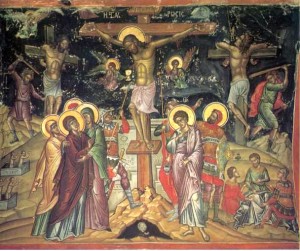Thinking Liturgically: Who is Our Helper?
 Why do we go to Mass? While this might seem like an easy question, try and figure out a way to describe why we go to Mass in a quick and easy fashion. Traditionally, it is said the point of Mass is fourfold: that of adoration, reparation, intercession and thanksgiving. To anyone well versed in liturgical theology, they can tell you what this means. But can the average person in the pews? They aren’t meant to be theologians, they just want to go worship.
Why do we go to Mass? While this might seem like an easy question, try and figure out a way to describe why we go to Mass in a quick and easy fashion. Traditionally, it is said the point of Mass is fourfold: that of adoration, reparation, intercession and thanksgiving. To anyone well versed in liturgical theology, they can tell you what this means. But can the average person in the pews? They aren’t meant to be theologians, they just want to go worship.
If we are looking for a good example, we can find one in the Prayers at the Foot of the Altar. After imploring God’s justice, the priest gives the following declaration while making the sign of the Cross:
“Our help is in the name of the Lord, who has created the heavens and earth.” (Psalm 124:8)
If we want a reason to go to Mass, it is above all that of help. If there is one thing that is true today, it is that everyone is seeking answers for something. Even those who love our secular culture admit there are problems society cannot even begin to understand. While many seek the advice of pop culture or a new government program, Catholics are called to seek the guidance and help of “the one who created heaven and earth.” In addition to creating both, he created the rules which govern both. Should we not also assume that He can provide us a way to follow those rules which lead to true peace?
In order to do this, we must adopt the proper attitude. The wise King in Proverbs tells us that “the fear of the LORD is the beginning of wisdom.” (Proverbs 1:7) That fear is awfully close to what we would view as the adoration due only to God. It is a reverence that we are encountering something far beyond our ability to comprehend, and our limited understanding compels us to accept it. Surely such a person would be able to provide the answers and help we seek.
The intercession we seek is made possible by the sign the priest makes during this saying. The Sign of the Cross is the ultimate symbol of reparation. It is a sign of the God who spared nothing out of love for His prized creation, even His own life. Since there is no forgiveness of sins except by the shedding of blood (Hebrews 9:22), perfect blood (Hebrews 4:15) provides perfect forgiveness of sin. (Hebrews 10:18)
This aspect of the faith cannot be emphasized enough. At every Mass you attend, every sin you have committed since your previous attendance at Mass is perfectly forgiven. All too often Catholics are presented as people constantly in fear that the sins they have committed cannot be forgiven. If history has told us anything, it is that all of us, after the commission of a mortal sin, feel it cannot be forgiven.
Hebrews tells us that when we are forgiven of our sins, that forgiveness is total. Yet due to our imperfect natures, we will continue to sin. For that reason, we must continue to seek out the Cross of Christ with greater and greater frequency throughout our lifetime. This is the root of the Sunday Obligation every Catholic has to attend Mass. We attend Mass because we need forgiveness. Christ’s forgiveness overcomes our weakness.
The cross is the means through which that weakness is overcome. This can be a hard saying for people. Even Christ’s Apostles were willing to accept every other kind of Christ except that of a suffering Christ who dies for sins. (Matthew 16:21-25) Even if, like them, we have trouble believing in that Christ intellectually, believe the work of the Cross. Even if you can’t fathom the depths of such forgiveness, give it a shot anyways. Ask those sins to be washed away by the blood and water from the side of Christ. (John 14:12)
After that forgiveness, the only acceptable response is that of gratitude and thanksgiving. The Bible states that after forgiveness, there is no remembrance for sin. The English language views remembrance as a simple recalling of a past event, and that really isn’t accurate. The Greek word is mnaomai. In the Bible, such a remembrance causes a change in behavior (John 2:22, Acts 11:16, Jude 1:17 Rev 16:19) Instead of remembering our sins, we remember God’s deliverance.
Not surprisingly, this is the context of Psalm 124 that the priest quoted. The entire Psalm recalls not only how God delivered them from tribulation, but how without that deliverance, they would have perished. Without that deliverance, they had only their sins to remember, that is, to live in. The difference between Christians and the world is not the magnitude or multitude of our sins. The difference is we approach the Cross, and live a life where remembrance of God’s deliverance transforms our life.
So next time someone asks you why you go to Mass, you don’t need a theological treatise. All we need is a fragment of a sentence: to experience God’s help.

